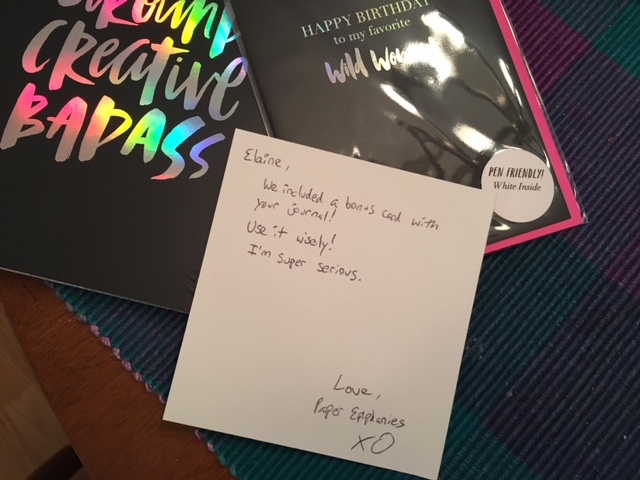Generosity & authenticity: Going the extra millimeter
I received two packages this week, things I ordered online. Both packages contained a little something extra, intended to surprise and delight me as a customer. Let’s see how that went:
Package #1
I know it’s only August, but I ordered myself another planning journal to use next year. Hey—the company was having a sale. I bought one undated journal but the package contained two books. A printed card explained:
“Our company revolves around giving so we’ve decided to give you a free [journal] to give to one of your loved ones.”
Sounds like generosity, right? And my loved one was thrilled. Until we opened the free journal to find that it’s a 2016 model, useful only for the next three months. So they may say “our company revolves around giving” but I quickly translated that as:
“We didn’t want to pulp our excess stock.”

Great customer service from Paper Epiphanies
Package #2
My first order from Paper Epiphanies contained not just the blank “All Around Creative Badass” journal I’d ordered, but also a birthday card, and a hand-written note advising me:
“Use it wisely! I’m super serious.”
Not sure whether it’s the card or the journal I’m supposed to use wisely. But the “I’m super serious” makes me smile every time I think about it.
That’s generosity. That’s going the proverbial extra mile. And it worked: I’ve already placed my next order.
What does this have to do with speeches?
Quite a lot, actually. When you’re offered the opportunity to speak, you want your speech to be the one with the surprise—the something extra that people didn’t expect, didn’t know they needed, but that puts a smile on their face (and, ideally, a new thought in their brains). Delight your audience and they’ll bond with you, they’ll remember you. And, yes, they’ll probably want to work with you if you have a service you sell, or buy your product.
But if your speech amounts to nothing more than a 20-minute commercial for your brand, if you don’t engage your generosity and offer people anything of value that they can make their own and use, they’ll resent the time they spent listening to you. (That’s assuming they’re polite enough to listen in the first place.)
But—I hear you say—the journal would be useful for over three months. Yes. And if someone used it for three months, they’d probably want to buy one for next year, too. That’s the same model drug dealers use to cement their customer relationships—”the first taste is free.” (At least that what I’ve read.)
Unlike the journal company, Paper Epiphanies gave me something I can use whenever I like; the birthday card has no expiration date. It may well be excess stock—perhaps “Happy birthday to my favorite Wild Woman” wasn’t a big seller for them (as unlikely as it seems)—but to me it just looks like a thoughtful gift. They get to show me additional merchandise; I get to send someone a nicer birthday card than I could find in the grocery store. That’s adding value, you bet.
Chris Anderson, the curator of TED Talks, tells a story of a speaker who was so blatantly self-promotional that Anderson felt compelled to interrupt him. In his invaluable book TED Talks: The Official TED Guide to Public Speaking, Anderson writes:
“Here’s the irony. This greedy approach to speaking doesn’t even serve the speaker’s interest. I’d be amazed if he got a single booking from anyone in that audience. And even if he did, it had to be offset by a loss of respect from others in the room. Needless to say, we never posted the talk online.”
The journal company may “revolve around giving,” but you wouldn’t know it from their giveaway. Whether you’re selling consumer products or making a speech, make sure your words and your actions align. And be generous!